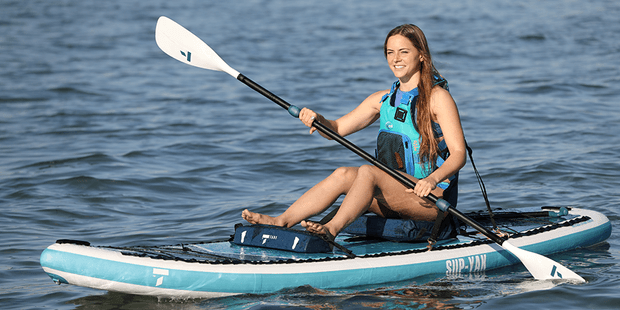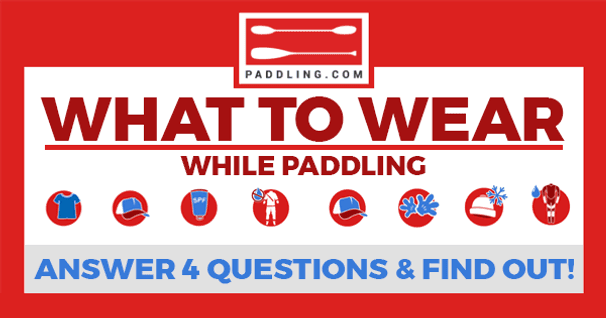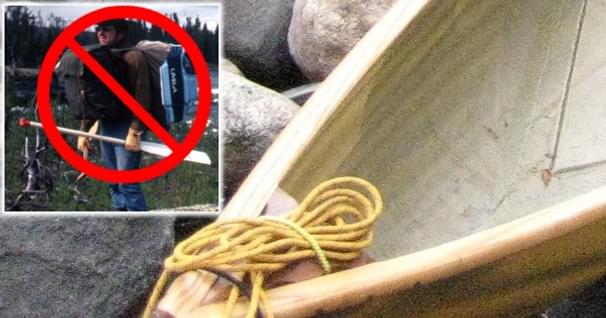Overnight Kayak Camping
One of the most regarded luxuries of a kayak is its use as a means of "escape", a chance to ply quiet waters; far from the madding crowd; at one with nature — or one's self. It's also a wonderfully spontaneous means of sneaking away for an overnight of remote shoreline or backcountry camping.
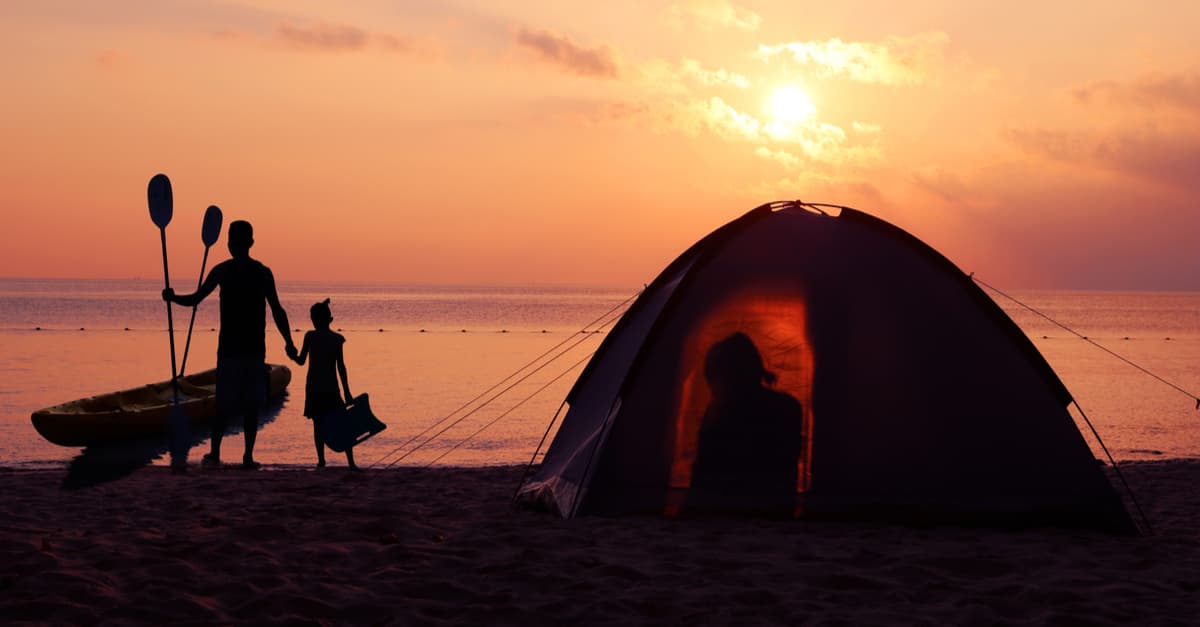
Even mega kayak expeditions can be broken down into a series of day paddles. And where the hiker's camping pack is squarely on his/her shoulders, we kayakers sit in ours and paddle it. Overnight/weekend kayak camping can be as involved and complex as we dare or as casual and simple as we choose.
Oftentimes the frequency of opportunity to kayak camp is determined by the proximity of water access camping sites from our home. Even those living deep in the heart of the Midwest have scores of primitive river camps accessible for quick get-aways. Having such options, when coupled with our own desired levels of camping luxury, means a kayak camping overnight is just a few paddle strokes away.
Most kayakers quickly learned that most of the gear they had been using for backpacking works perfectly for kayak camping, too. Exposure to moisture and in some cases higher volume gear were limiting factors (water environment/small compartment hatch covers). Our clothing had to be re-thought for the big water environment and we had to acquire a few paddling skills. Once on shore, however, our basic backcountry camping skills took over.
TAHE 10'6 & 11'6 SUP-YAK Inflatables
2-in-1 Kayak & Paddle Board complete packages for single or tandem use.
How to Select the Right Gear
The beauty of kayak camping is the range or depth of actual camping one can delve into. A simple overnight campsite on a remote beach might require nothing more than a sleeping bag, tarp covering, and a simple cooking kit. If you can read the weather and trust the signs of your environment, you might even skip the tarp and sleep under the stars. Point is, you don't need a full range of gear to enjoy a short get-away.
That said, it should always be your priority to carry an emergency kit, ditch kit, survival gear, whatever you call it. Whether you are paddling the pond or out along a remote coast for a week, you should always carry certain emergency items with you. As far as other typical camping equipment, sometimes a serendipitous outing means leaving some of the luxuries behind — or not. Too often we become a bit of a techy gear head, thinking we must have the latest camp stove, light or other paddling gadget. Some do offer the advantage of even more weight and size reduction as well as also bringing hi-tech function to the field — all of which can be incorporated into our inventory of gear.
That's one of the keys for a rewarding overnight/weekend kayak trip. We can target our gear to the level of experience we want to enjoy. On an extended trip, food volume and quality are issues, fresh water is a constant issue, adequate clothing and gear for an ever-changing environment — and it all must be carried along from Day One!
Short trips still provide us with an opportunity to see how much we can carry, how luxurious we want our camp to be and gives us a chance to test some of the gear we may be planning on using on a more extensive paddling trip later. At other times, we just may want to be the minimalist camper and enjoy a modest but fulfilling night just a few paddling miles along the shore.
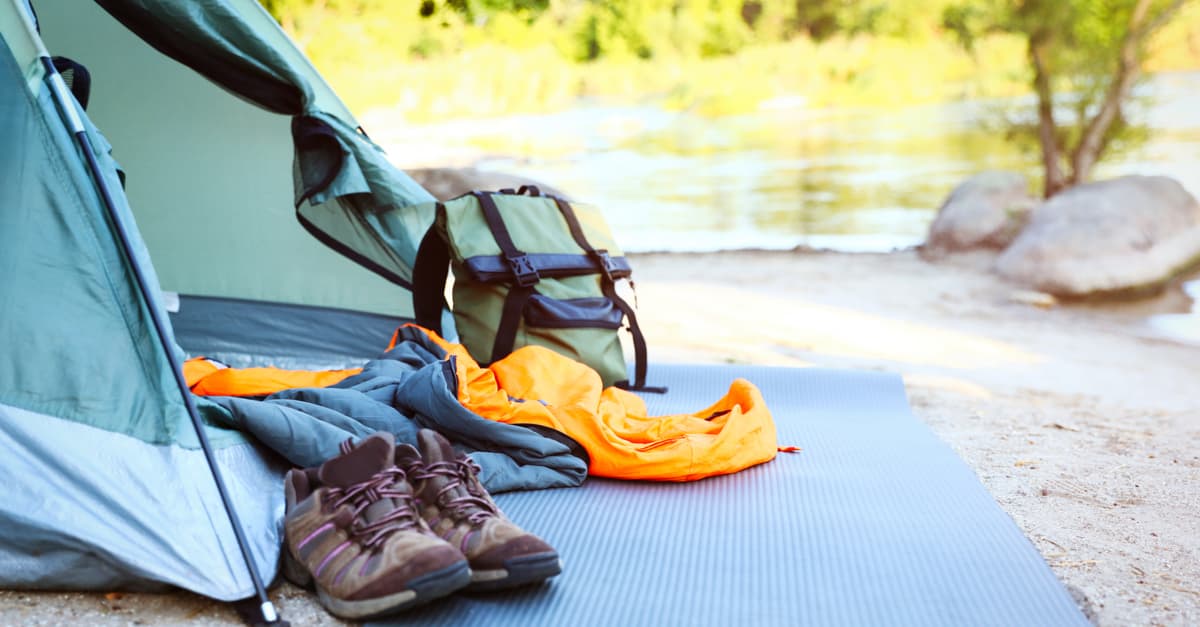
Overnight Camping Gear
Here are some options I've considered when gearing up for a short overnight camping outing in my kayak.
- Kayaking Basics: Obviously your primary paddling gear is essential. Perhaps you can skip the dry/wet suit, but your standard paddling clothing, matched for season and waters remains the same. This is, after all, still a water sport. Same goes for paddle and other basic boat accessories.
- Weather Watch: Oftentimes mid-seasonal weather can be quite stable. If you trust forecasts you may be confident enough to head out to catch 2-3 days of predicted incredible weather. Learning to read Ma Nature's telltale signs and having access to barometric pressure readings can help you predict upcoming weather.
- Tent/Shelter: A lightweight tent is always a good option, while knowing how to utilize a ground cloth for a makeshift overhead shelter may be all you want to bring. Sleeping out under the stars, bathed in moon/starlight and soothed with a light, bug-sweeping breeze is always an option to consider, too. Incorporating a beach log or even your kayak as an anchor point can give you ample overhead protection in all but the windiest, pounding downpours.

- Sleeping Bag/Pad: Comfortable sleeping is always preferred, so bringing an adequate sleeping bag is essential. If you've ever camped before you should be aware of temperature ranges and dampness concerns — all apply here, especially the moisture thing. Pads are always handy; even an otherwise sandy beach can have enough rocks and mixed debris to make sleeping uncomfortable. Scooping out shallow shoulder and hip depressions in the sand will usually reward you with minimal stiffness come morning.
- Meals: Besides the basics from which we all make menus (trail mixes, Ramen noodles, instant oatmeal, etc.), a short trip may mean you have room for a small cooler that will keep food crispy and colorfully fresh for the next 24-48 hours. There are many excellent soft-sided coolers that can fit into a kayak. Frozen food acts as ice the first day and are ready to cook up on day two. Trying out minimalist/survival cooking techniques on a short overnight is an appropriate and timely venue for hands-on learning of how to deal with these kinds of emergency fares you might have to rely upon some day.
- Stove/Cook Kit: You can't always build a fire, so a camp stove is probably essential. Small, efficient stoves often limit what you can cook and how you can cook it. Personally I prefer a small, strong portable grill that allows me to heat everything from a pint size pot of water to a Dutch oven load of stew over wood or stove heat. Again, you will probably have the room so why not splurge on eating while you may have skimped in other areas — or not! On such short trips you might even just take along components of a larger, fuller kit. Maybe you just need to boil some water and eat out of a couple of cups. If an open fire is part of your experience, by all means cook over the fire!
- Clothing/Other Gear: It's unlikely, and not particularly advisable, to head out on even a short trip without any prior backpacking/camping experience (or without someone who is versed in outdoor methods) so you probably have most of the clothing you'd need for paddling and then around camp. If not, think protection and comfort for the elements you'll be facing.
Kayak Camping Tips
Here are a few more helpful kayak camping tips:
- Stuff sacks too large to fit through hatch cover openings can be emptied, the sack passed through the hole, and then re-stuffed back into the sack through the opening. The gear is protected and the process is reversed upon unloading for the day.
- Canoers use a Duluth pack to hall bundles of gear over portages and into the campsite from the shored canoe. Kayakers can do the same. Carry a large strapped bag and load all those small, storable items from throughout your kayak into one bag and save trips hauling all your separate little gear bundles up to camp.
- Deadman anchors - In addition to traditional stakes, even those made for sand, consider tying your lines to a log or rock and burying it in the sand. This is a deadman anchor. Lines are a bit harder to re-tighten but offer a secure anchor in otherwise softer ground.
- Angle your "roof" tarp slightly to encourage run-off, also rig a set up to collect that rainwater. A simple channel in the roof that pours into a container is a quick and safe way to resupply drinking water... and in some desperate cases a trickle of morning dew as well.
Camping from a kayak, particularly on a short haul, is a means of a casual escape, of satisfying our wanderlust appetite with a small morsel of adventure. It offers all the pleasures of extended kayak tour/camping with much more timeliness for playing and relaxing.
Be safe, and have fun out there!
Tom Watson is an avid sea kayaker and freelance writer. For more of Tom's paddling tips and gear reviews go to his website: www.wavetameradventures.comHe has written 2 books, "Kids Gone Paddlin" and "How to Think Like A Survivor" that are available on Amazon.com.
Related Articles
Wondering what to wear when going paddling? Answer 4 quick questions and instantly learn what you need…
In 1971, I outfitted and guided three wealthy Chicago men--the least affluent of which earned a quarter…
Drying is probably the most ancient way to preserve food for a very long period of time. You have…
In the mid-seventies, I shared an afternoon with the famous woodsman, Calvin Rutstrum, whose flagship…
